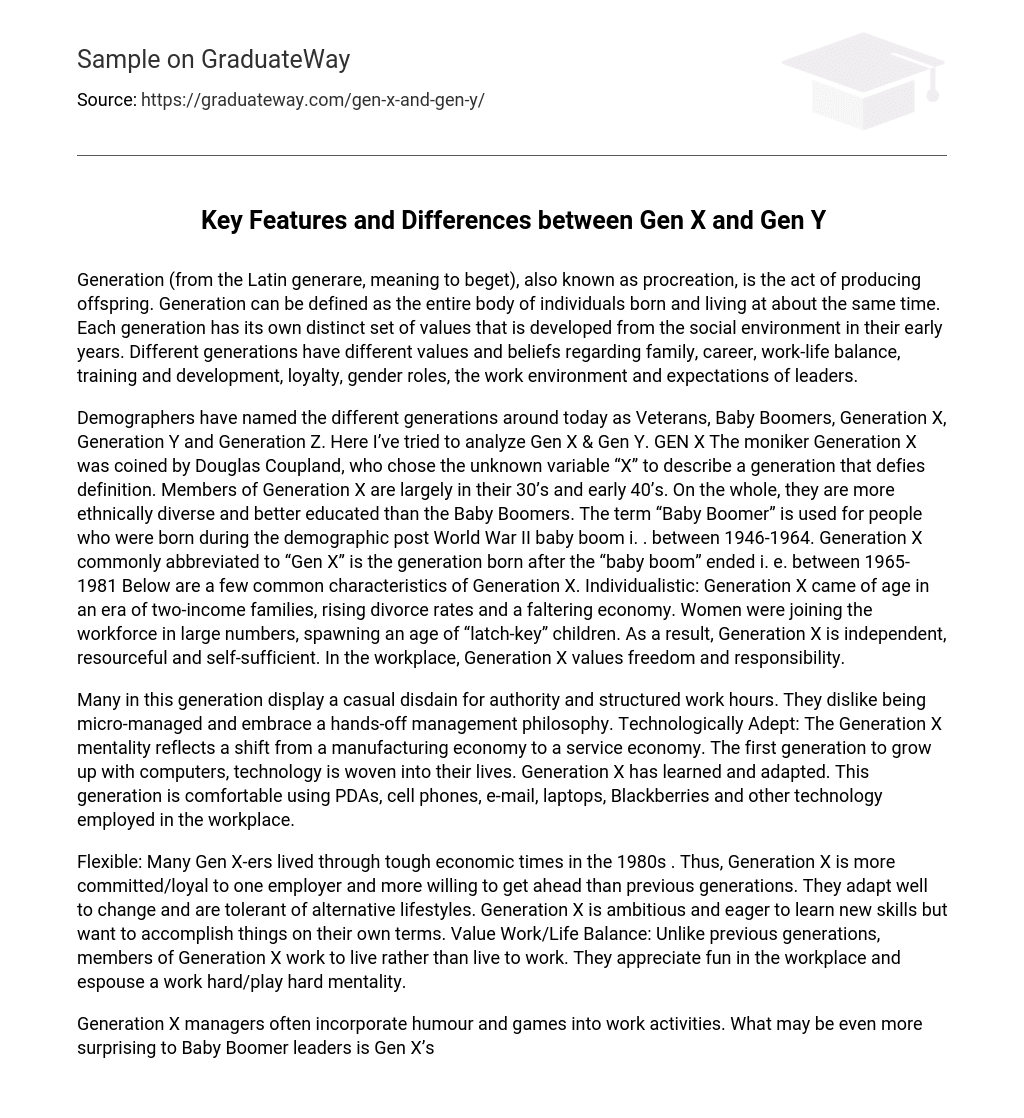Generation (from the Latin generare, meaning to beget), also known as procreation, is the act of producing offspring. Generation can be defined as the entire body of individuals born and living at about the same time. Each generation has its own distinct set of values that is developed from the social environment in their early years. Different generations have different values and beliefs regarding family, career, work-life balance, training and development, loyalty, gender roles, the work environment and expectations of leaders.
Demographers have named the different generations around today as Veterans, Baby Boomers, Generation X, Generation Y and Generation Z. Here I’ve tried to analyze Gen X & Gen Y. GEN X The moniker Generation X was coined by Douglas Coupland, who chose the unknown variable “X” to describe a generation that defies definition. Members of Generation X are largely in their 30’s and early 40’s. On the whole, they are more ethnically diverse and better educated than the Baby Boomers. The term “Baby Boomer” is used for people who were born during the demographic post World War II baby boom i. . between 1946-1964. Generation X commonly abbreviated to “Gen X” is the generation born after the “baby boom” ended i. e. between 1965-1981 Below are a few common characteristics of Generation X. Individualistic: Generation X came of age in an era of two-income families, rising divorce rates and a faltering economy. Women were joining the workforce in large numbers, spawning an age of “latch-key” children. As a result, Generation X is independent, resourceful and self-sufficient. In the workplace, Generation X values freedom and responsibility.
Many in this generation display a casual disdain for authority and structured work hours. They dislike being micro-managed and embrace a hands-off management philosophy. Technologically Adept: The Generation X mentality reflects a shift from a manufacturing economy to a service economy. The first generation to grow up with computers, technology is woven into their lives. Generation X has learned and adapted. This generation is comfortable using PDAs, cell phones, e-mail, laptops, Blackberries and other technology employed in the workplace.
Flexible: Many Gen X-ers lived through tough economic times in the 1980s . Thus, Generation X is more committed/loyal to one employer and more willing to get ahead than previous generations. They adapt well to change and are tolerant of alternative lifestyles. Generation X is ambitious and eager to learn new skills but want to accomplish things on their own terms. Value Work/Life Balance: Unlike previous generations, members of Generation X work to live rather than live to work. They appreciate fun in the workplace and espouse a work hard/play hard mentality.
Generation X managers often incorporate humour and games into work activities. What may be even more surprising to Baby Boomer leaders is Gen X’s approach towards monetary benefits. Baby Boomers have traditionally equated success with money and power, and may be shocked to realize that Gen X does not. For the Gen Xi’an, success is defined by the ability to achieve a work-life balance rather than climbing a corporate ladder. GEN Y They’re young, smart and brash. They may wear flip-flops to office or listen to iPods at their desk.
They want to work, but they don’t want work to be their life. This is “Generation Y” – taking their place in an increasingly multigenerational workplace. Gen Y feels that it is definitely more upbeat and optimistic than its counterparts – The “Gen X” and “Baby Boomers”. Not only this, it is more at ease than Gen X with other age groups and loves to accept challenges. “Gen Y”-ers belong to a more open culture. Unlike Gen X-ers , who looked for stability in jobs, GenY -ers switch jobs more often. They look for recognition from their seniors.
Besides being upbeat and ambitious in nature, Gen Y wants to achieve everything in a short span of time. “Let’s do it at any cost” is the attitude. Born in the mid-1980’s and later (i. e. 1983-2000 ), Generation Y is in its 20s and is just entering the workforce. With numbers estimated as high as 70 million, Generation Y (also known as the Millennials ) is the fastest growing segment of today’s workforce. As firms compete for available talent, employers cannot ignore the needs, desires and attitudes of this vast generation. Below are a few common traits that define Generation Y.
Tech-Savvy: Generation Y grew up with technology and rely on it to perform their jobs better. Armed with Blackberries, laptops, cell phones and other gadgets, Generation Y is plugged-in 24 hours a day, 7 days a week. This generation prefers to communicate through e-mail and text messaging rather than face-to-face contact and prefers webinars and online technology to traditional lecture-based presentations. Achievement-Oriented: Nurtured and pampered by parents who did not want to make the mistakes of the previous generation, Generation Y is confident, ambitious and achievement-oriented.
They have high expectations of their employers, seek out new challenges and are not afraid to question authority. Generation Y wants meaningful work and a solid learning curve. Team-Oriented: As children, Generation Y participated in team sports, play groups and other group activities. They value teamwork and seek the input and affirmation of others. Part of a no-person-left-behind generation, Generation Y wants to be included and involved. Attention-Craving: Generation Y craves attention in the forms of feedback and guidance.
They appreciate being kept in the loop and seek frequent praise and reassurance. Generation Y may benefit greatly from mentors who can help guide and develop their young careers. Conclusion :- Whatever the generation it is, I still believe that we are shaped by our beliefs. In general, people believe they are partially or totally influenced by the group. They tend to be on that particular Gen side that they believe in. This is how influence comes about; it’s not a matter of generation. That which seems the height of absurdity in one generation often becomes the height of wisdom in another. ~Adlai Stevenson





